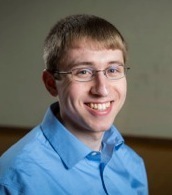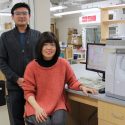Prolific chemistry student wins Churchill Scholarship
As a child, Joshua Shutter‘s introduction to chemistry came through library books, learning to make rock candy and bottle rockets.
“I never would have thought that someday I would be helping to search for molecules in interstellar space as a physical chemist,” he says.

Joshua Shutter
Shutter has become one of only 14 young American scholars selected as 2014 recipients of the Churchill Scholarship, one of the most sought-after recognitions in higher education. The scholarship will allow him to complete a one-year Master of Philosophy (MPhil) at the University of Cambridge while residing at Churchill College.
“This kind of event is of a stature that can be life- and career-changing,” says Bob McMahon, professor and chair of chemistry and one of Shutter’s research mentors, along with chemistry professor R. Claude Woods. “We’re all so excited for him.”
Shutter’s win adds to a remarkable year of achievements by UW–Madison students. The university is one of only four American institutions (including Harvard, Princeton and the Georgia Institute of Technology) boasting Rhodes, Marshall and Churchill scholars in the same year.
A senior majoring in chemistry, Shutter, originally from Green Bay, is also pursuing certificates in physics and mathematics. As a Churchill Scholar, he plans to pursue an MPhil in chemistry under Professor Rod Jones with the Centre for Atmospheric Science at Cambridge.
“The potential to perform research alongside esteemed faculty was one of the primary reasons why I chose to attend UW–Madison.”
Joshua Shutter
Shutter is president of the American Chemical Society Student Chapter and has served as a faculty assistant for Chemistry 344, leading laboratory and discussion sections. He received a competitive Hilldale Undergraduate/Faculty Research Fellowship in 2012.
On the national level, Shutter was named a Goldwater Scholar in 2013. In 2012, he spent several weeks at NASA’s Jet Propulsion Laboratory to model the photochemistry of planetary atmospheres. Thanks to his performance, he was named a NASA Student Ambassador through 2013.
“The potential to perform research alongside esteemed faculty was one of the primary reasons why I chose to attend UW–Madison,” says Shutter. “Overall, the ability to perform research early on in my undergraduate career at UW–Madison both motivated me in my classes and opened up a variety of opportunities, from NASA to the Churchill Scholarship, that would have seemed unimaginable to me four years ago.”
Woods first encountered Shutter in his Chemistry 116 class when assigning research projects to each student. According to Woods, who has now co-mentored Shutter for three years, Shutter’s project has gotten better and better as the years have gone by.
“It was pretty obvious from the beginning that Josh was a very unusual student,” says Woods. “Of course he’s very smart, with a wide background of experience, but he’s also the most productive undergraduate student I’ve worked with in the whole time I’ve been here. He has a feeling for how to get the job done: go right to something and make it work. All of those attributes are the kinds of things that spell success in research.”
“Of course he’s very smart, with a wide background of experience, but he’s also the most productive undergraduate student I’ve worked with in the whole time I’ve been here.”
R. Claude Woods
For McMahon, that breadth has made a difference in the way Shutter approaches problems. Shutter thinks about science, then uses his skills in writing and other areas to synthesize and express himself with clarity and strength of purpose.
“In his sophomore year, he wrote a research proposal for the Hilldale competition,” says McMahon. “He only talked to me about the basic topic, but his proposal was as good or better than what we see from our third-year graduate students — and he hadn’t even taken all of our basic courses.”
McMahon marvels at Shutter’s skills in areas that enhance his research: computer programming, operating sophisticated instrumentation and more.
“It’s been amazing how he is skilled in so many different things,” says McMahon. “That isn’t chemistry, per se; he can just dive into a problem and get to the bottom of it.”
Since 1963, the Winston Churchill Foundation of the United States has awarded nearly 480 Churchill Scholarships to American college graduates who have demonstrated extraordinary talent and outstanding achievement in the sciences, engineering or mathematics. The award is worth up to $50,000 and covers all tuition and fees, a living allowance and travel.
In 2010, Daniel Lecoanet became UW–Madison’s first Churchill Scholar in 30 years, studying applied mathematics and theoretical physics at the University of Cambridge. Previously, engineer David Goodrich studied at Cambridge in 1980-81 and Eugene Katz studied for a three-year term between 1966 and 1969.
“I’m confident we won’t have to wait another 30 years for our next Churchill Scholar,” said Julie Stubbs, director of UW–Madison’s Office of Undergraduate Awards, in 2010.
She was right.
Tags: chemistry, research, student awards, students



